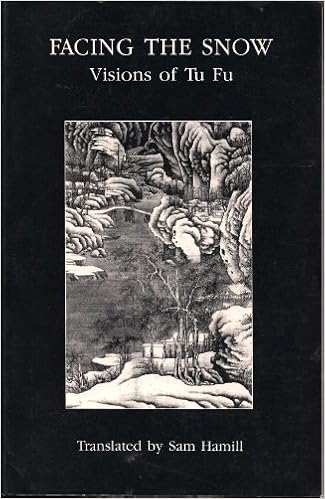Hamill's introduction makes clear that Tu Fu suffered many of the same difficulties that Li Po did, as their lives ran roughly parallel, with Tu Fu, the younger, dying earlier also. However, both failed to obtain government jobs except on the lowest end, and both suffered the consequences of the wars that broke out in China around 750 that lasted for a decade or so. The poems reflect that. Like Li Po's work, we have only a segment of what Tu Fu actually wrote, maybe one-third.
Hamill's intrdocution, however, only touches on Tu Fu's life. Most of it is about translation--the difficulties of moving a poem from one language to another and the reason for his choices. Tu Fu was apparently quite a formalist, with many of his poems built around set stanzas and rhymes. English offers so much less in terms of rhyming opportunities that Hamill chooses instead to focus on the images and content, which seems a wise move.
The selection here connected more to me personally than the poems in the Li Po collection I read. Both poets write their share of nature poems, and poems about drinking, but Tu Fu also deals a lot with relationships and with the effects that world events have had on his life. It likely helped that Hamill doesn't leave some words untranslated, as did Hinton with the Li Po poems. As such, one doesn't feel quite as much the foreigness of Tu Fu's work. But beyond that, Tu Fu just seemed better at expressing the anguish of the world around him and of his own life. My favorite poems were those about war. He didn't delve so much into generic expressions about soldiers fighting as personal ones about how wars affect him and those around him. The communities he lives in feel the pain that having their young men and eventually old men too stripped from them to go fight yet another battle against the invading forces; they also feel the anguish of not having a strong government to defend them. There are poems expressing the difficulties of both positions. It's as if the people are pained either way. The speakers in Tu Fu's work migrate as invaders take over their land. They express the pain of the refugee. And later, when able to return, there is both a kind of joy in coming home again and a sadness. The homes they lived in five years ago are run down, unmaintained; many of the old neighbors have returned, but some never will. What is left but to wander out into the forest or along the river, seeking solace, knowing that you'd like to have a drink but that the folks you'd have shared one with are now gone.







No comments:
Post a Comment